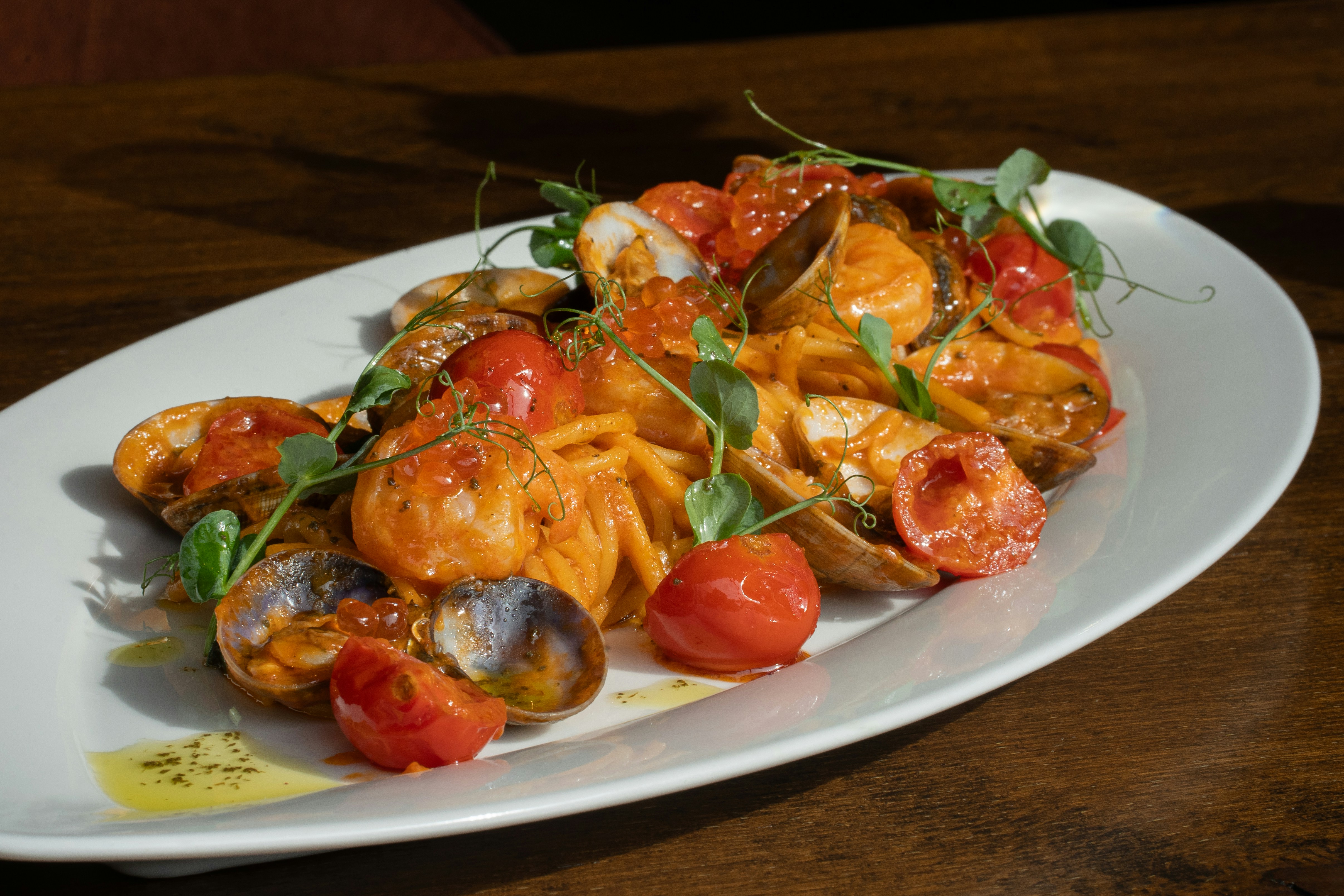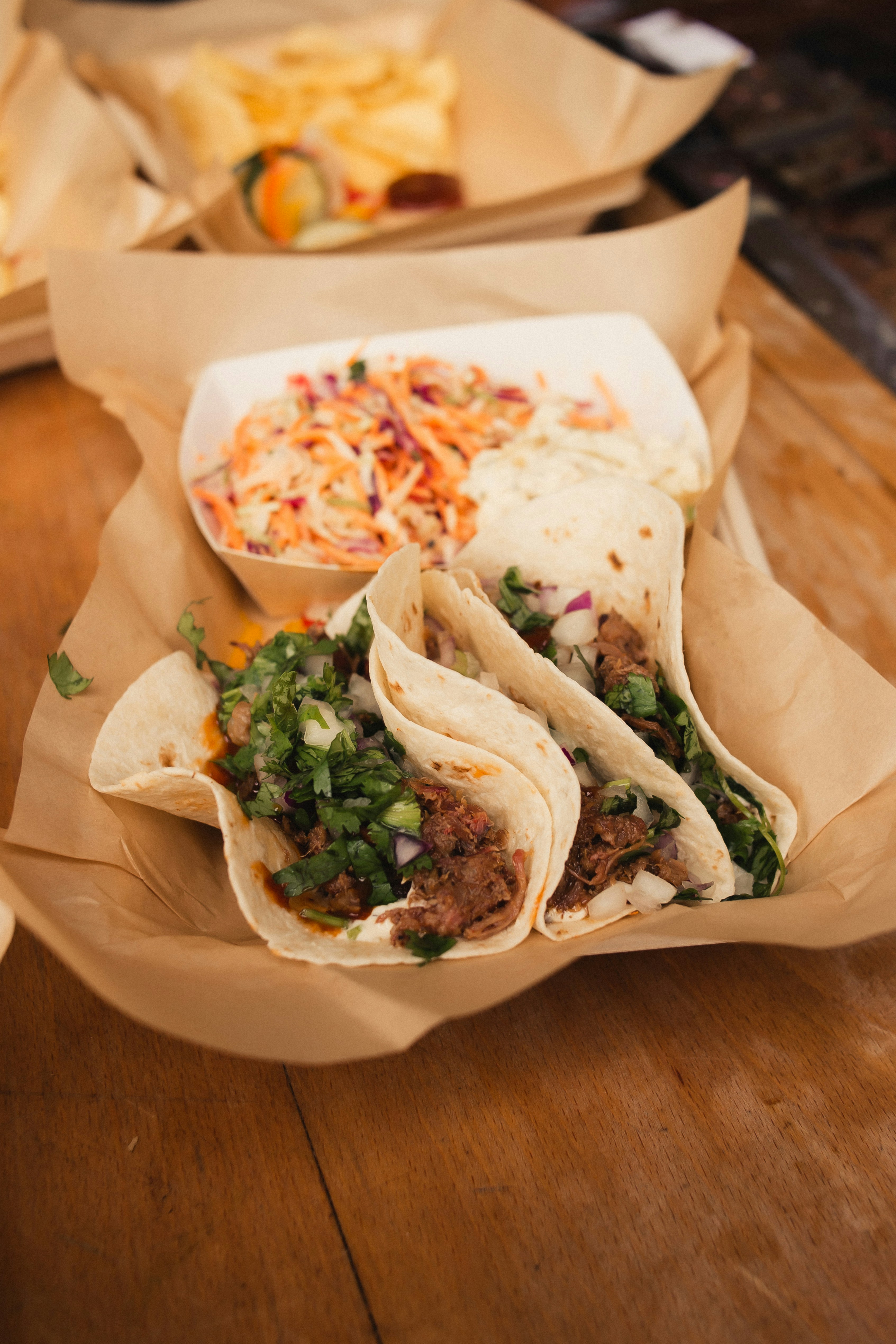
Introduction to Vegan Comfort Food
Vegan comfort food represents a burgeoning niche in the culinary world that is rapidly gaining traction, particularly among those who typically enjoy a meat-centric diet. Comfort food has long been associated with nostalgia and warmth, often drawing from traditional recipes that offer familiarity and satisfaction. However, with a growing awareness of health, environmental issues, and ethical considerations, many are seeking ways to indulge in these comforting dishes without animal products. Enter vegan comfort food, which artfully reimagines classic recipes with plant-based ingredients, making it an appealing option for everyone, including meat-lovers.
The rising popularity of plant-based diets is not merely a trend; it is a reflection of shifting values surrounding food consumption. Many individuals are exploring veganism or at least incorporating more plant-based meals into their routines, driven by a desire for healthier lifestyle choices, reduced carbon footprints, and concerns over animal welfare. Vegan comfort food successfully bridges the gap between indulgence and mindfulness, allowing individuals to enjoy favorite dishes without compromise.
Vegan versions of timeless classics such as mac and cheese, shepherd’s pie, and fried chicken are designed to satisfy cravings and evoke the same sense of familiarity and warmth as their traditional counterparts. Advances in culinary techniques and the growing availability of high-quality plant-based proteins—such as lentils, chickpeas, and various legumes—allow chefs and home cooks alike to create meals that not only taste delicious but also provide the rich textures and flavors reminiscent of meat.
By substituting plant-based ingredients for animal products, these inventive recipes encourage exploration and experimentation in the kitchen, enticing readers who may not consider themselves vegan to delve into this exciting culinary realm. The comforting nature of these dishes is universal, promising satisfaction to any palate while promoting a more sustainable way of eating.
Overview of Plant-Based Proteins
Plant-based proteins have gained significant popularity in recent years, emerging as a nutritious and sustainable alternative to animal-derived products. These proteins are derived from various sources, each offering unique flavors, textures, and health benefits. Key examples include legumes, tofu, tempeh, seitan, and pulses. Incorporating these ingredients into one’s diet can enhance nutritional intake while promoting a plant-centric lifestyle.
Legumes, such as lentils, chickpeas, and black beans, are rich in protein, fiber, vitamins, and minerals. They are particularly beneficial for heart health and can stabilize blood sugar levels due to their low glycemic index. Tofu and tempeh, both derived from soybeans, are versatile proteins that can absorb flavors in savory dishes, making them excellent meat substitutes. Tofu is softer and is often used in soups and smoothies, while tempeh has a firmer texture and is ideal for grilling or stir-frying.
Seitan, often referred to as wheat meat, is another remarkable plant-based protein that closely mimics the texture of meat. It is made from gluten, making it high in protein but unsuitable for those with gluten sensitivities. Finally, pulses, which include peas and beans, not only provide protein but are also low in fat and high in fiber, contributing to overall digestive health.
In addition to their nutritional advantages, plant-based proteins contribute positively to sustainability efforts. The production of these proteins generally requires less water and land compared to traditional livestock farming, reducing the carbon footprint associated with meat consumption. This aligns with the growing movement towards environmentally conscious eating.
Overall, the integration of plant-based proteins into meals offers a myriad of benefits ranging from improved health to a more sustainable lifestyle, making them an excellent choice for everyone, including meat lovers seeking flavorful and satisfying alternatives.
Starters: Vegan Appetizers for Non-Vegans
Creating a delightful selection of vegan appetizers can appeal to even the most devoted meat-lovers, showcasing the versatility and richness of plant-based ingredients. One popular option is vegan buffalo wings, which substitute traditional chicken with cauliflower florets. These florets are coated in a spicy buffalo sauce that mirrors the tangy flavor of conventional buffalo wings. When baked to crispy perfection, they offer a satisfying crunch and robust flavor, making them an engaging starter for any gathering.
Another standout vegan appetizer is stuffed mushrooms. The earthy, umami notes of mushrooms serve as the perfect vessel for a savory filling, typically made from a blend of ingredients like walnuts, nutritional yeast, garlic, and herbs. This combination delivers a flavor profile reminiscent of traditional stuffed mushrooms, which are often made with sausage or cheese. By employing a mix of textures and spices, these vegan stuffed mushrooms can capture the essence of their meat-based counterparts while remaining entirely plant-based.
Additionally, consider preparing vegan sliders using lentils or chickpeas as the base. When seasoned properly and formed into small patties, these legumes can replicate the mouthfeel and savory experience of classic meat sliders. Topped with a tangy vegan mayo, fresh vegetables, and served on a soft, mini bun, these sliders are not only visually appealing but also packed with flavor. Another fantastic choice is guacamole served with homemade tortilla chips. This creamy, rich dip is a favorite at social gatherings, and its plant-based nature allows everyone to indulge without compromise.
By incorporating bold flavors and familiar textures, these vegan appetizers provide heartwarming comfort, proving that plant-based dishes can be a hit even among non-vegan guests. Each starter is designed to spark joy and satisfy cravings, elevating any appetizer spread while promoting inclusivity for all dietary preferences.
Main Courses: Hearty Vegan Entrées
Transforming traditional meat-based dishes into delicious vegan alternatives not only offers a compassionate dining experience but also delights the taste buds with flavor-packed options. Vegan chili serves as a perfect introduction to this concept, skillfully incorporating legumes, vegetables, and spices to create a dish that is equally hearty and fulfilling. By using a variety of beans—such as black beans, kidney beans, and chickpeas—this plant-based chili achieves a satisfying texture, while providing ample protein to keep anyone satiated. Additionally, a blend of spices like cumin, smoked paprika, and chili powder can elevate the dish, making it robust and aromatic.
Another exquisite option is creamy mushroom risotto. This classic Italian comfort dish can easily be adapted to a vegan version using arborio rice, vegetable broth, and a plant-based cream alternative. The earthy flavors of mushrooms can be enriched through sautéing with garlic and fresh herbs. Using nutritional yeast not only provides a cheesy flavor but also enhances the nutritional profile, supplying vitamin B12 for those pursuing a vegan lifestyle. Cooking this risotto slowly allows the rice to absorb the rich broth, resulting in a creamy and indulgent entrée that will impress even the most ardent meat lovers.
Furthermore, plant-based burgers have become increasingly popular among individuals seeking satisfying and hearty meals. The key to crafting a successful vegan burger lies in balancing flavors and achieving the ideal texture. Ingredients like lentils, black beans, oats, and finely chopped vegetables create a firm base. Spicing them up with onion, garlic, and fresh herbs provides depth while maintaining moisture with ingredients like flaxseed or aquafaba. Once grilled to perfection, these burgers can be served on fresh whole grain buns, complemented by avocado, vegan mayo, and crisp lettuce, making them an enticing meal option for all diners.
Sides: Delicious Vegan Accompaniments
When it comes to creating a satisfying and well-rounded meal, the importance of side dishes cannot be overstated. For those looking to enhance their dining experience, vegan side dishes can serve as perfect accompaniments, complementing main courses beautifully. Whether you are preparing dinner for a family gathering or a casual weeknight meal, these plant-based sides can please even the most steadfast meat-lovers.
One popular choice is creamy mashed potatoes, which can be easily transformed into a vegan delight using dairy-free alternatives such as almond milk or cashew cream. The result is a rich and velvety texture that competes with traditional recipes. Adding roasted garlic or fresh herbs elevates the dish, making it an exceptional complement to any main course. Additionally, the incorporation of plant-based butter can enhance flavor while maintaining the creaminess that makes mashed potatoes a comfort food staple.
Another excellent accompaniment involves roasted vegetables. Seasonal vegetables such as carrots, Brussels sprouts, or sweet potatoes can be drizzled with olive oil and seasoned to perfection with herbs like rosemary or thyme. Roasting these vegetables intensifies their natural sweetness and brings out savory flavors, adding depth to the overall meal. Not only are these roasted sides visually appealing on the plate, but they also provide a variety of essential nutrients, making them a health-conscious choice for any meal.
For a refreshing touch, consider a vibrant quinoa salad, featuring diced cucumbers, cherry tomatoes, and a zesty lemon vinaigrette. This dish not only adds color to the table but also introduces a protein-rich element, ensuring a filling and satisfying experience for all diners. By including such versatile vegan side dishes, one can create a delightful meal that appeals to both vegans and non-vegans alike while promoting a more inclusive dining atmosphere.
Desserts: Sweet Vegan Treats
Indulging in dessert is a universal joy, and it is possible to satisfy sweet cravings without compromising on dietary principles. Vegan desserts have gained popularity not only for their health benefits but also for their ability to deliver rich flavors and delightful textures. Numerous recipes demonstrate that plant-based ingredients can create decadent desserts that everyone, including meat-lovers, can enjoy.
One of the standout recipes is chocolate avocado mousse, which showcases the versatility of avocados beyond savory dishes. By blending ripe avocados with cocoa powder, maple syrup, and a splash of vanilla extract, a luscious, creamy dessert emerges without the need for dairy. This mousse is not only rich in healthy fats, but it also contains antioxidants from cocoa, making it a guilt-free indulgence that captures the essence of traditional chocolate mousse.
Another remarkable option is coconut cream pie. Utilizing coconut milk and whipped aquafaba (the liquid from a can of chickpeas) can yield a delightfully airy filling that mirrors the texture of conventional cream pies. The crust can be made from crushed graham crackers or a gluten-free alternative, ensuring a delightful base that supports the rich filling. Topped with shredded coconut or chocolate shavings, each bite of this pie feels luxurious yet remains entirely plant-based.
These vegan dessert recipes prove conclusively that sweet treats can be both enjoyable and health-conscious. The use of natural sweeteners, plant-based fats, and nutrient-laden ingredients elevates these dishes beyond mere indulgence, ensuring that anyone can indulge without the worry of compromising their dietary choices. By promoting culinary creativity, vegan desserts can appeal to an array of palates, turning skeptics into enthusiasts, one sweet treat at a time.
Nutritional Value of Vegan Comfort Foods
Vegan comfort foods present a compelling alternative to traditional meat-based dishes, often boasting enhanced nutritional profiles. One of the most significant advantages of plant-based recipes is their increased fiber content. Unlike conventional comfort foods, which may rely heavily on meats and refined grains, vegan recipes incorporate whole foods such as legumes, grains, and vegetables, all of which are rich in dietary fiber. This increase in fiber is beneficial for digestive health, helps regulate blood sugar levels, and supports cardiovascular health by lowering cholesterol levels.
In addition to having a higher fiber content, vegan comfort foods typically contain reduced levels of saturated fat. Saturated fats, commonly found in animal products, can contribute to various health problems, including heart disease and obesity. By substituting meat and dairy with plant-based proteins, such as beans, lentils, nuts, and seeds, individuals can significantly lower their intake of saturated fats while still enjoying satisfying and hearty meals. This reduction may lead to improved heart health, weight management, and overall wellness.
Moreover, vegan comfort foods are often packed with essential vitamins and minerals. Many plant-based ingredients, such as leafy greens, whole grains, and nuts, are rich in nutrients like vitamin C, potassium, magnesium, and folate. These vitamins play crucial roles in maintaining bodily functions, supporting the immune system, and keeping energy levels stable. Consuming a variety of plant-based foods can not only fulfill nutritional needs but also enhance overall health and vitality.
Overall, embracing vegan comfort foods can lead to a more balanced diet. By focusing on wholesome, plant-based ingredients, one can experience substantial health benefits while still enjoying the familiar flavors and textures of comfort food. The shift to vegan recipes offers an opportunity to nourish the body while celebrating the joy of cooking and eating.
Substitutes for Meat and Dairy
Transitioning to a vegan diet does not necessitate sacrificing the beloved flavors and textures of comfort food. Several substitutes for meat and dairy can effectively replicate traditional ingredients, enabling you to enjoy hearty meals without animal products. Understanding how to choose and utilize these alternatives can enhance your culinary experience, making vegan cooking both fulfilling and delicious.
One versatile substitute for meat is jackfruit, a tropical fruit that mimics the texture of pulled pork. When cooked, its fibrous strands absorb flavors wonderfully, making it an ideal choice for tacos, sandwiches, or savory casseroles. Another popular option is tempeh, a fermented soybean product that adds protein and a nutty flavor. Its firm texture allows it to hold up well in stir-fries, salads, or grilled dishes, proving particularly satisfying to meat-lovers.
When it comes to dairy, numerous alternatives can help replicate creamy textures and rich flavors. For instance, almond milk can be used in place of cow’s milk in recipes requiring a liquid component. Its mild taste allows it to blend seamlessly into smoothies, sauces, and baked goods. In scenarios where creaminess is essential, coconut milk acts as a fantastic alternative, providing a luscious base for soups and desserts.
Nutritional yeast is another beneficial addition to vegan cooking. Known for its cheesy, umami flavor, it can be sprinkled over popcorn, mixed into pasta sauces, or used to create a plant-based cheese sauce. By incorporating these substitutes thoughtfully, you can recreate recipes that resonate with traditional comfort food flavors while adhering to a vegan diet. With a little creativity, your culinary repertoire can flourish, proving that plant-based eating can be both satisfying and enjoyable.
Conclusion: Embracing Vegan Comfort Food
In recent years, the culinary landscape has evolved, leading to a growing appreciation for vegan comfort foods. Traditional comfort foods, often associated with richness and indulgence, are now being reimagined through innovative vegan recipes that appeal to both herbivores and meat-lovers alike. The use of plant-based proteins such as lentils, chickpeas, and tofu allows for the creation of hearty and satisfying dishes that cater to diverse palates.
As we explore the world of vegan cooking, it becomes evident that these plant-based recipes are not only nutritious but also environmentally sustainable. The shift towards vegan cuisine promotes a more conscious approach to food consumption, allowing us to enjoy comfort food while minimizing our ecological footprint. Whether it is a creamy vegan mac and cheese or a robust chickpea curry, these reimagined classics can evoke a sense of nostalgia and comfort without sacrificing flavor or satisfaction.
Moreover, embracing vegan comfort food presents an opportunity for culinary creativity. Experimenting with different ingredients and techniques can yield delicious surprises that will delight family and friends, regardless of their dietary preferences. By incorporating a variety of spices, grains, and plant-based proteins, home cooks can explore endless possibilities and inspire a love for vegan cooking.
Savoring these vegan recipes not only contributes to personal health but also fosters a connection to the broader movements for sustainability and ethical eating. As more individuals discover the rich flavors and textures of vegan comfort food, there is the potential for a cultural shift that embraces compassionate eating habits. This journey is both enjoyable and fulfilling, encouraging everyone to taste the delightful rewards of plant-based cuisine.





Add comment